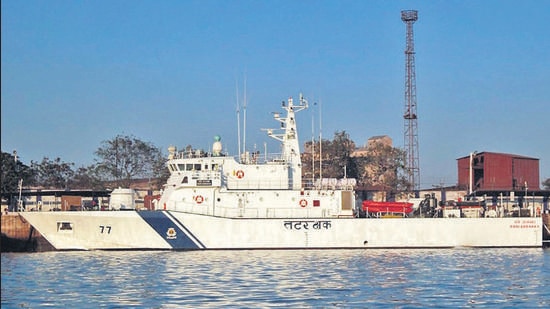Rani Abbakka: The forgotten female admiral
Giving a glimpse of Rani Abbakka’s exemplary will in taking on the mighty Portuguese, Suryanath Kamath, who was the chief editor of Karnataka State Gazetteer, said her planning and war tactics left the invading forces clueless.
A fleet of the Indian coast guard off short patrolling vessels bears the name of the queen from present-day Karnataka’s coast. Even though a fading memory, the exploits of Rani Abbakka II against the Portuguese is not forgotten in the state. She was one of the few female admirals of India, who gave the Portuguese a bloody nose in the sea and on her lands.

Giving a glimpse of Rani Abbakka’s exemplary will in taking on the mighty Portuguese, Suryanath Kamath, who was the chief editor of Karnataka State Gazetteer, said her planning and war tactics left the invading forces clueless.
“More than 200 Portuguese came to coastal areas of Karnataka and demanded goods be sold at a price fixed by them. Rani Abbakka protested the demand. She asked the people to not yield to the men and with the help of Prince Venkatappa Nayak of Keladi she took the Portuguese head-on,” said Kamat said
Rani Abbakka was not willing to accept the Portuguese embargo since her ships had been travelling to the Middle East to sell spices, fabrics etc. For this trade, she was in an alliance with the Zamorin of Kozhikode. In the true family tradition, she had continued defying the Portuguese and trading directly with the Middle East.
When the Portuguese captured a rich ship of hers returning from Mecca, she planned a secret attack. “On a night, her fishermen soldiers, the Mogaveeras and Moplahs, got into boats, sneaked amongst the Portuguese ships. The Portuguese navy had to retreat with heavy losses. It was one of the rare occasions where the Portuguese lost to an Indian kingdom,” said Kamat.
The historian referred to family tradition because her mother Rani Abbakka I, known as the queen of Ullal, too was a fierce enemy of the Portuguese. “She worked in close alliance with the several chiefs of Malabar and against her husband who was an ally of the Portuguese,” read the gazette notes on her.
Dr Tukaram Poojary, a retired history professor who researched Abbakka, said that her husband Lakshmanappa wanted to join hands with the Portuguese, so she left him. “She then took over as the ruler of Ullal, which she got as the matriarchal system was practised at that time. She took on the Portuguese in three battles,” he said.
As per records, she took on the Portuguese when she decided to stop paying tributes to them when they attacked the chief of Cannanore (today’s Kerala), her erstwhile ally in 1555. Three years later, the queen took on the Portuguese by assisting a naval attack led by the Raja of Cannanore against the Portuguese.
“The Portuguese were so incensed at this that he reduced Mangalore to ashes. The queen again ceased to pay tributes to the Portuguese, when they declared war on her ally, the Raja of Cannanore in 1566.”
In 1567, a punitive expedition was sent against her by the Portuguese governor under Joao Peixote, according to the Gazette. The Portuguese army attacked Ullal under General Joao Peixoto. He captured the city and occupied the palace. However, the Queen managed to escape and hide in a mosque. In the dead of night, with 200 soldiers, she raided the Portuguese and managed to kill General Peixoto and 70 soldiers. The invaders fled to their ships. She followed and killed the admiral of the fleet.
In 1588, however, Goa Viceroy Anthony D’ Noronha led another attack against Ullal with a grand Armada. Ullal fell and was destroyed in this attack. The queen also died, as per the legend, leading her men from the front.
But after her death came Abbakka II. “It was under her rule, the Portuguese suffered one of the biggest naval battles in the subcontinent. Abbakka, the second, took over in 1594. She gained great fame throughout the Indian Ocean by attacking and burning the Portuguese fleet in 1618. This ensured that invasions by the Portuguese stopped in the coastal regions of Karnataka,” said Poojary.
The news of the Portuguese loss to a woman made international news across Arabia, Persia and Europe. Thereafter, the Portuguese never attempted to attack Ullal or come in the way of her trading activities.
On learning about the heroism of this Queen, Persian Traveller Pietro dellaVelle visited her court in 1623. His travelogue provides a useful account of her personality and concern for her people. “She was a gentle lady of high dignity, dressed in simple clothes, yet had an alluring figure. Though her exterior posterity and habit represented rather a dirty Kitchen wench than a delicate and noble Queen; her graceful voice and her prudent and judicious speech bespoke her nobility,” says Pietro dala Velle’s accounts.
While records have little details about the exploits of this queen, it is the folklore, particularly the art form of Yakshagana, that puts light on her life. One of these accounts talks about a war tactic used by the queen. A torch made of dry coconut leaves popularly known as ‘thoote’ in Tulu language was used by soldiers to attack ships.
Abbakka’s soldiers used the thoote as a striking war strategy. Hundreds of these thoote were swung like arrows towards the enemy ships that were anchored near the coast or offshore. When the ships caught fire many lost their lives. The rest of the soldiers would jump into the sea to save themselves only to be killed by Abbakka’s soldiers who fought with swords and spears.
While the debates over women in combat roles continue, history, especially the story of Abbakka, shows how the country has a rich history of women leading armies and navies from the front.




